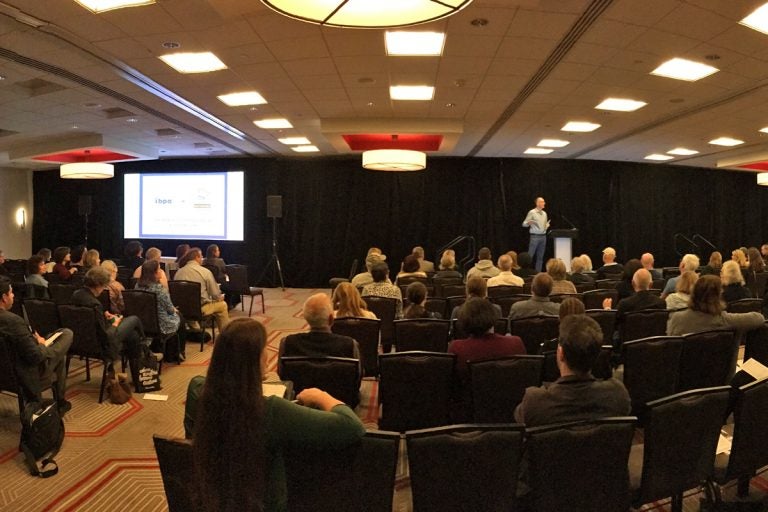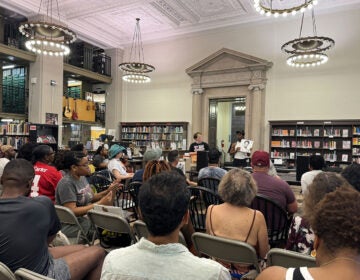Authors going indie — it’s a Philly thing
Being “indie” once defined a creative project as not being backed by a major producer. It is a way of life, and it is ingrained in the spirit of the City of Brotherly Love.

Writers are shown seated at a session during the Independent Authors Conference in Philadelphia Nov. 3-5, 2017. (Image courtesy of Tim Conaway)
Being “indie” once defined a creative project as not having the backing of a major producer, or having a do-it-yourself feel. Today indie is a genre all its own, but it is more than that. It is a way of life, and it is ingrained in the spirit of the City of Brotherly Love.
From William Penn and the Quakers telling England “So long and thanks for all the fish” (a paraphrase) and settling in Pennsylvania for religious independence, to a hot summer in the 1700s when our forefathers created one of the most famous indie publications of all time, to Sylvester Stallone’s “Rocky,” it is hard to separate Philly from indie culture. So it made sense for BookBaby’s first Independent Authors Conference to be held here last month.
I had never heard of BookBaby, a company that provides self-publishing support, until a friend shared an ad for IAC on social media. For a while I had been asking myself if I should send my manuscripts out to agents and publishing houses accepting unsolicited material, or if I should enter the labyrinth of self-publishing.
Of course when I thought of self-publishing, a whole slew of other questions pressed in: Isn’t there a stigma attached to self-publishing? Will people take my writing seriously? Are the success stories of Andy Weir, author of “The Martian,” and others just anomalies? So finding such an ad on my news feed was welcome — and with the conference right in my backyard, I decided to take the plunge into the world of self-publishing.
Every time self-publishing comes to mind, I think about author Seth Godin’s interview in the documentary “PressPausePlay.” He talks about the power of self-publishing and his success with it: from reaching over 5 million people with a free ebook with only a laptop, to self-publishing a hard copy and making more money on the book he gave away for free than the one he sold.
“This changes everything. The industry is dead,” says Godin. No longer are there gatekeepers to stand in our way. BookBaby seems to have this philosophy embedded into their fiber.
Leading up to the conference, I wondered if this would be a weekend-long infomercial for BookBaby. Steven Spatz, founder and CEO, addressed this question in his opening keynote. This conference was bigger than the company — it was about writers becoming authors. It’s time to let the world know that self-publishing is more than mere vanity books, that it is a serious way writers can produce their content and forge their careers.
So with gallons of coffee at the ready, 350 writers, authors, and marketers were immersed into a weekend full of panels, workshops, and cocktail hours. Mr. Spatz assured us this was research.
One of the greatest takeaways from the conference was conversations I was privileged to have had with the other writers. I met several self-help authors/coaches, publicists, and marketers, but one gentleman stuck with me in particular: a grandfather. We sat for a while and I shared my story of writing children’s literature, and he told me why he was there. His goal was to create a legacy for his grandchildren and future families. His family has a rich history of oral storytelling, but no one had ever written down their stories. So being the family raconteur, he wanted to achieve this for them.
This was really exciting to me. This is how powerful self-publishing is. It can lead someone like Andy Weir from self-publication to publishing house representation and beyond to a Hollywood film. And it can help a grandfather, someone who is not out for literary fame, but to just share stories with his grandchildren.
I still am not sure if I should I go a more traditional route or fully embrace the indie lifestyle and the powerful freedom to produce a work from start to finish, but having a weekend when authors and writers are empowered and encouraged to create and share great stories was worth it all. There may be a stigma to self-publishing, but it is up to good self-published authors to forge the path and prove they can produce literature from their own home that looks no different from a work published by a major house.
—
Tim Conaway is a freelance writer in the Philadelphia area. He is the founder of ugalicreative, LLC, a multimedia design consultancy providing media support to nonprofits, small businesses, and educational institutions.
WHYY is your source for fact-based, in-depth journalism and information. As a nonprofit organization, we rely on financial support from readers like you. Please give today.



